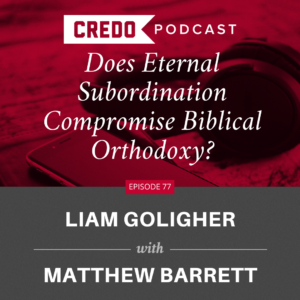
New Credo Podcast: Does Eternal Subordination Compromise Biblical Orthodoxy?
 The trinitarian view known as Eternal Functional Subordinationism (EFS) has become a popular position over the last several decades. In this view, the Trinity is defined as a type of society, a society or roles and relationships. What kind of society? A society of hierarchy. One of the central claims of EFS is the Son’s functional subordination, or submission, to the Father and within the immanent Trinity. Some go so far as to give ultimate supremacy to the Father over the Son and Spirit. It has even been suggested that ultimate glory belongs to the Father alone. Now EFSers even use Nicene categories, like eternal generation, to justify this type of hierarchy within the immanent, eternal life of God.
The trinitarian view known as Eternal Functional Subordinationism (EFS) has become a popular position over the last several decades. In this view, the Trinity is defined as a type of society, a society or roles and relationships. What kind of society? A society of hierarchy. One of the central claims of EFS is the Son’s functional subordination, or submission, to the Father and within the immanent Trinity. Some go so far as to give ultimate supremacy to the Father over the Son and Spirit. It has even been suggested that ultimate glory belongs to the Father alone. Now EFSers even use Nicene categories, like eternal generation, to justify this type of hierarchy within the immanent, eternal life of God.
But in this podcast, Liam Goligher and Matthew Barrett explain why EFS has far more in common with novel, social views of the Trinity in the modern era than it does with historic Christianity. Barrett asks Goligher what first alarmed him and motivated him to be so bold to confront EFS. Together they examine the ingredients of EFS and explain why its logic compromises biblical and orthodox trinitarianism. Furthermore, Goligher and Barrett address the habit of manipulating the Trinity for societal projects since supporters of EFS frequently use the doctrine as a prototype for gender roles. Goligher and Barrett – with a short guest appearance from Liam’s dog – also explore the ways we should and shouldn’t use scripture in theology and they encourage the church to stay faithful to the God of the Bible and Nicene orthodoxy despite recent departures.
For more information concerning these difficult issues, consult chapter 8 of Barrett’s book, Simply Trinity: The Unmanipulated Father, Son, and Spirit (Baker, 2021).

